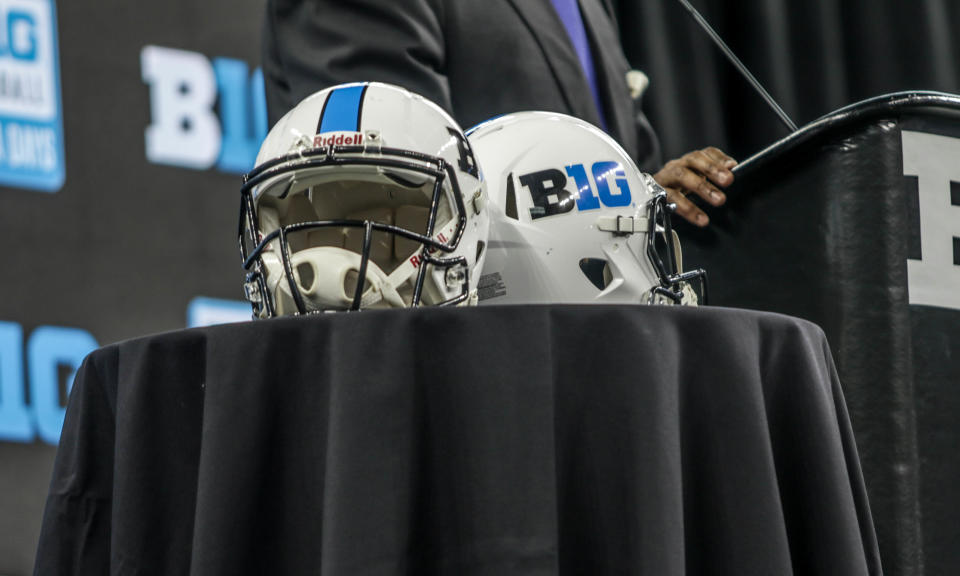Big Ten, ACC, Pac-12 alliance expected to be announced Tuesday

Hold onto your butts, three of the remaining four Power Five conferences are set to make an announcement to rival the SEC on Tuesday.
The long-rumored and reported Big Ten-ACC-Pac-12 alliance is expected to be revealed as the trio of Power Five conferences come together to ensure that the SEC doesn’t retain all the power and prestige after adding Oklahoma and Texas last month. Several outlets are reporting what to expect, with the first drop coming from Yahoo’s Dan Wetzel and Pete Thamel while The Athletic’s Nicole Auerbach added more context. The latter has reported that the announcement is set for 2 p.m. EDT.
A lot of changes could come from the new alliance, but it isn’t strictly about
List
What Big Ten coaches anonymously said about Michigan football in 2021

List
What Big Ten coaches anonymously said about Michigan football in 2021

teams from each conference playing one another. Let’s take a look at more about what the outlets are reporting.
List
What if? Who would be in a 30-team college football mega-conference?

Scheduling

Photo: Mark J. Rebilas-USA TODAY Sports Copyright © 2007 Mark J. Rebilas
OK, yes -- a big part of the new alliance does have to do with scheduling. According to the reports, the Big Ten and ACC could drop from nine conference games per season to just eight while the Pac-12 has that as an option. Regardless, each school would play one school from the other conference each year, meaning that a school like Michigan could potentially play North Carolina and USC one year and then play Clemson and Oregon the next. It doesn't appear that there's a home-and-home type agreement. More from Yahoo:
Also, with Notre Dame being aligned currently with the ACC, games against the Irish would count towards the Big Ten or Pac-12's quota in that regard.
College Football Playoff expansion

Joe Camporeale-USA TODAY Sports
With the seeming nefarious dealings of Oklahoma and Texas with the SEC, along with ESPN -- which holds the rights to the College Football Playoff -- a big part of the alliance is holding off on expanding the postseason effort to 12 teams. With these three conferences aligned, other television partners could get involved, which makes sense since the Big Ten has its primo agreement with FOX Sports, as does the Pac-12. The ACC is more aligned with ESPN as of current. Notre Dame, of course, has its agreement with NBC. Still, with the SEC having dropped CBS for ESPN, the alliance would seek to create a bit more parity rather than allowing the 'worldwide leader' to dictate much of what happens in the College Football Playoff or in scheduling. The Athletic: ($)
There is a strong feeling among administrators in the Big Ten, Pac-12 and the ACC that Playoff expansion — in whatever form it takes — should not take place until the end of the current contract with ESPN, in 2026. Expansion prior to 2026 would allow for ESPN to remain the exclusive rights-holder of the Playoff, and it would also mean that the new format (with its additional games and rounds) would not go to the open market. One driving force behind the alliance for two conferences is a concern that ESPN controls and dictates too much of the sport. Industry sources have pointed out that a multi-round event with multiple broadcast partners such as Fox, CBS and/or NBC would also incentivize those media companies to invest more in their coverage of and commitment to college football.
Had the alliance not become a likely reality, there's a good chance that the SEC, aligned with ESPN, really would have had all of the power in that regard. Additionally, given that the bowl games mostly take place in either the ACC/SEC/Pac-12 footprint, it could give the Big Ten some leverage to hold some playoff games up north, Yahoo says:
A possible wrinkle the group could propose would be a push for some playoff games to be controlled by conferences, not necessarily bowl games. That would allow, say, the Big Ten to stage a playoff game at a neutral site within its footprint. That could happen inside the domed stadiums of Indianapolis and Detroit, or maybe outdoors in Cleveland or Chicago. This would replace using only traditional bowl games, which are located in the South or West.
It'll be interesting to see how much parity the alliance could create in that regard.
Blunting the power of the SEC

Photo: Isaiah Hole
With the new alliance, it can be assumed that the only expansion of any conference would then come from the Big 12. Of course, schools like Kansas and Iowa State could give a hard look to the Big Ten; Oklahoma State, TCU or Baylor could look at the Pac-12; while West Virginia and others may look to the ACC. But the big thing is not letting the SEC dominate the discourse and plans in college athletics, as it will soon have many of the marquee names, like Alabama, LSU, Florida, Georgia, Texas and Oklahoma. That played a big role in this coalition of the willing.
All have felt pressure to respond with some sort of counterpunch to the SEC, which is consolidating further power with its new additions and a commissioner who carries great sway over college athletics.
But ultimately, the alliance would allow for the three conferences to ensure that one conference doesn't rule them all and that one conference doesn't bind them.
The Alliance will center on a shared vision for the future governance of college athletics. For now, the Alliance will mean the three leagues can, among other things, form a voting block that will blunt the growing influence of an expanded SEC. It also allows three leagues that consider themselves like-minded to gain voting power on issues as the NCAA’s influence diminishes.
Conclusion

Photo: Isaiah Hole
Ultimately, this is a power move that certainly could have big ramifications across college sports. Particularly looking at football -- like we usually do -- though some internet commenters will lament names like Wake Forest, Cal or Rutgers, ultimately, this creates a sort of mega-conference, even if there isn't regular play between particular teams. While the SEC has the aforementioned powers, this alliance would pair Michigan, Ohio State, Penn State, Wisconsin, Clemson, North Carolina, Miami (FL), USC, Oregon, Washington and other big names. If there was going to be an answer to the SEC, this is better than conference expansion. The only concern we have is whether it creates some loss of luster when it comes to bowl game matchups, particularly in games like the Rose Bowl, where the Big Ten and Pac-12 regularly face off at the year's end. Still, it shouldn't impact those games too much, and the payoff for having this alliance means more than each conference fending for itself now. The SEC might have quite a bit of cache, but it would certainly be lessened by this new allegiance. [listicle id=38136]
1
1

